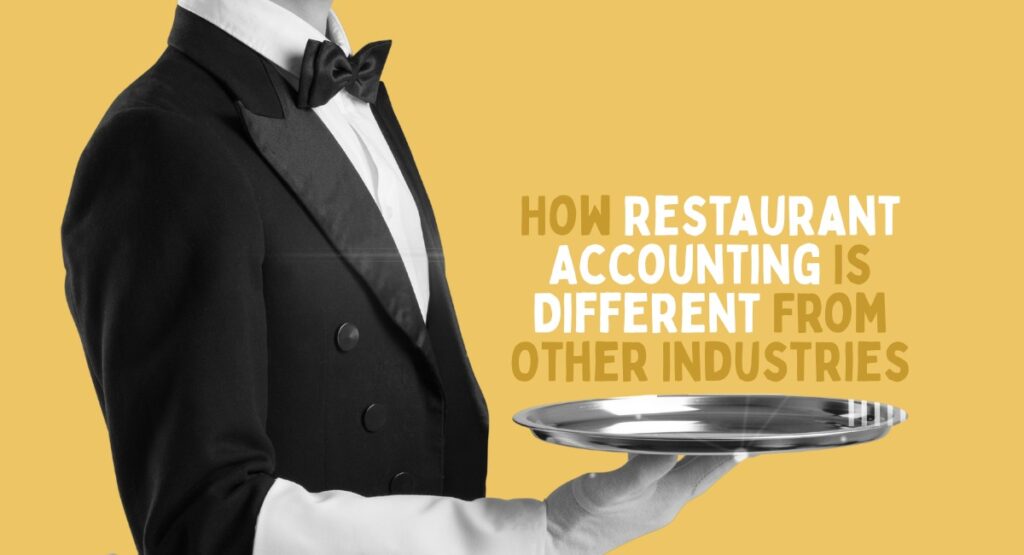How Restaurant Accounting in the UAE Differs From Other Industries

Running a restaurant looks easy from the outside: serve food, take payments, balance the books. But if you’ve ever tried managing the numbers, a web of VAT, corporate tax, municipal and tourism levies, you know it’s anything but simple. Restaurants in the UAE deal with unique challenges that make their accounting very different from retail shops, service companies, or online businesses.
Let’s walk through why.
Table of Contents
ToggleRevenue is fragmented and taxable in specific ways
Restaurants don’t just earn money one way. They deal with dine-in orders, delivery apps, catering, events, vouchers, and sometimes hotel or tourism-related charges. Each of these can be taxed differently. That’s where the rules get complicated.
In March 2025, the Federal Tax Authority (FTA) updated the VAT Executive Regulation. This changed how businesses must handle invoices, input tax recovery, and proof for exports. For restaurants, this means their POS (point-of-sale) systems must be set up correctly so every charge is recorded in line with VAT and accounting rules.

On top of that, in May 2025, the FTA issued a clarification (VATP044) confirming that if a UAE restaurant purchases “concerned services” from abroad, such as overseas marketing or foreign software, the business may need to account for VAT using the reverse-charge mechanism. The clarification also explains the type of supporting documents that can be used instead of always self-issuing a tax invoice.
So yes, even that digital ad package from outside the UAE affects your restaurant’s tax.
POS, invoices and evidence, more than a cash register
In many industries, invoices are straightforward. In restaurants, they’re not. Every tax invoice must include specific details like supplier name, date, and correct VAT amounts. If a restaurant forgets or leaves details out, they might lose the right to recover VAT.
And because restaurants often split bills, add service charges, or create invoices for large events, their invoicing process needs extra care. A weak invoice can mean real money lost.
Inventory & wastage- audit pain points
Here’s another difference: food doesn’t last. Spoiled ingredients, staff meals, and complimentary dishes are part of the business. But all of this must be tracked.

When restaurants file Corporate Tax returns, they need clear records showing what stock was bought, what was used, and what was written off. Poor tracking makes it harder to justify deductions and may raise questions during a corporate tax audit, since the FTA requires clear evidence of stock usage and write-offs.
Corporate tax, entity choice and financing implications
In 2025, the FTA reminded business setups that even small restaurants run by individuals may need to register for Corporate Tax if their turnover goes above AED 1 million. This means sole proprietors and small cafés must separate personal and business accounts, and keep their books properly.
For larger restaurants, financing rules also matter. The Corporate Tax guide published in 2025 limits how much interest from loans can be deducted. Restaurants that borrowed heavily for fit-outs or equipment need to pay attention to these rules.
Free zone vs mainland- different documentation, different audits
If your outlet is in a free zone, the FTA’s Free Zone Persons guide explains that Qualifying Free Zone Persons must meet substance requirements, maintain adequate employees, prepare audited financial statements, and demonstrate operational presence to benefit from the 0% rate on qualifying income. Mainland restaurants, on the other hand, must comply with standard corporate tax rules and local municipality fees.

Mainland businesses must align with mainland corporate tax rules and local municipality fees. Your accounting policies should reflect where the legal entity sits.
Local levies and operating costs that change the math
It’s not just VAT and Corporate Tax. Restaurants in hotels and tourist areas often add municipality fees, service charges, or tourism taxes. The UAE government portal lists these charges, and they must be shown clearly on invoices.
In Dubai, new sewerage fees took effect in 2025 at 1.5 fils per gallon, rising to 2 fils in 2026 and 2.8 fils in 2027. While the fee looks small, across thousands of gallons per month it creates a noticeable operating cost for restaurants.
What restaurant owners should do
Here are a few simple steps every UAE restaurant should consider:
- Check your POS system – make sure every charge (dine-in, delivery, service charge, tourism fee) is linked to the right tax category.
- Keep strong invoices – without the correct details, you can’t recover VAT.
- Track stock carefully – record wastage, staff meals, and free dishes separately so you can explain them later.
- Review your tax position – check if you’ve crossed the AED 1m threshold for Corporate Tax, and look at your loan interest against deduction rules.
- Know your setup – free zone businesses need audits; mainland businesses need to follow local municipality rules.
Final word
What this really means is simple: restaurant accounting is operational and regulatory at the same time. You’re not just closing books. You’re proving compliance for VAT recovery, justifying costs for Corporate Tax, and accounting for location-specific levies. That reality affects business setup decisions, mainland vs free zone, whether to hire a tax consultant, and which accounting services or CFO support you bring in. Keywords that matter when you search for help: Business Setup mainland, Free zone, Accounting Services, VAT Consultancy Services, Corporate TAX, CFO Services, ICV Certification and Business Evaluation.
If you want, I can convert this into a one-page compliance checklist or a month-end Google Sheet that maps POS items → VAT treatment → supporting evidence. Say the word and I’ll make it now.
Disclaimer: This blog is intended for informational purposes only and is based on publicly available data from official UAE government sources, regulatory agencies, and reputable news outlets. While every effort has been made to ensure accuracy and compliance with UAE regulations, this content should not be taken as legal, tax, or financial advice. For specific guidance tailored to your business setup in the UAE, whether mainland or free zone , please consult licensed tax consultants, VAT consultancy services, or accounting professionals.
Sources (date, author/publisher, why it matters)
- VATP040 — Amendments to the UAE VAT Executive Regulation — Federal Tax Authority (FTA). 14 March 2025 (PDF). Confirms VAT ER changes and documentary requirements. URL: https://tax.gov.ae/Datafolder/Files/Pdf/2025/VATP040%20-%20Amendments%20to%20VAT%20ER%20-%2014%2003%202025.pdf. FTA UAE
- VATP044 — Concerned Services: Accounting for Output Tax, Issuing Tax Invoices, and Input Tax Recovery — FTA. 26 May 2025 (PDF). Critical for reverse-charge and invoice requirements. URL: https://tax.gov.ae/Datafolder/Files/Pdf/2025/VATP044-Concerned-services-Tax-invoices-and-input-tax-recovery-26-05-2025.pdf. FTA UAE
- Interest Deduction Limitation Rules (CTGIDL1) — FTA. April 2025 (PDF). Rules on interest deductibility and related-party debt. URL: https://tax.gov.ae/Datafolder/Files/Guides/CT/Interest-Deduction-guide.pdf. FTA UAE
- Corporate Tax — Tax Returns Guide — FTA. Nov 2024 (PDF). Details records, schedules and audit expectations. URL: https://tax.gov.ae/Datafolder/Files/Guides/CT/CT-Returns-EN-11-11-2024.pdf. FTA UAE
- FTA news: FTA urges Natural Persons to register for Corporate Tax — Federal Tax Authority. 28 Jan 2025. Explains AED 1m threshold and deadlines. URL: https://tax.gov.ae/en/media.centre/News/fta.urges.natural.persons.to.register.for.corporate.tax-before-end-of-march-2025-to-avoid-administrative-penalties.aspx. FTA UAE
- Taxes at tourist facilities — Official UAE portal (u.ae). Updated 27 Feb 2024. Lists tourism and municipal fees that affect restaurant invoices. URL: https://u.ae/en/information-and-services/visiting-and-exploring-the-uae/where-to-stay-in-the-uae/taxes-in-tourist-facilities. UAE Government Portal
- “13 new rules, fees, and tech coming into effect in the UAE in 2025” — Gulf News (Huda Tabrez). Last updated Jan 1, 2025. Covers sewerage tariff increases phased 2025–27. URL: https://gulfnews.com/living-in-uae/ask-us/10-new-rules-fees-coming-into-effect-in-the-uae-in-2025-1.1733224382470. Gulf News
- UAE Government PortalGulf News
FAQ
1. What type of accounting is used in restaurants?
Restaurants use accrual accounting with a heavy operational focus. Sales aren’t just “cash in, cash out”, they’re spread across dine-in, delivery, catering, and events, each tied to different VAT rules in the UAE. On top of that, inventory accounting matters more here than in most industries because food waste, staff meals, and comps all affect costs and deductions.
2. What is the best accounting method for a restaurant?
For restaurants in the UAE, the accrual method works best. It tracks income when it’s earned and expenses when they’re incurred, not just when money changes hands. This gives a clearer picture for VAT reporting, corporate tax filings, and audits. Pair it with strong POS integration so invoices, service charges, and municipal or tourism fees flow directly into the books.
3. What is restaurant “taking” in accounting?
“Taking” usually refers to the daily cash and sales count, the process of reconciling what the POS says with the physical cash, card payments, and delivery app settlements. In UAE terms, it’s also the point where you check if VAT has been applied correctly across each type of sale. A weak daily take can mean mismatched numbers and missed input tax recovery later.
4. How can an accounting firm target and be of assistance to the restaurant industry?
An accounting firm can add value by going beyond bookkeeping. For restaurants, that means:
- Mapping POS items correctly to VAT categories.
- Tracking wastage and stock so expenses can be defended in audits.
- Reviewing whether a business has crossed the AED 1m corporate tax threshold.
- Advising on free zone vs mainland tax treatments and municipality fees.
- Preparing audited financials if the restaurant is a Qualifying Free Zone Person.
The real pitch? Show restaurant owners that compliance and profitability go hand-in-hand when accounting is done right.
5. How do labor costs impact restaurant accounting practices?
Labor is one of the biggest cost centers in restaurants. Unlike retail, schedules shift daily, and so do costs, overtime, service charges, and gratuities all need clean records. In the UAE, service charges added to bills are taxable for VAT, so payroll and accounting systems must line up. Poor tracking doesn’t just hurt margins; it can also lead to errors in tax reporting.
